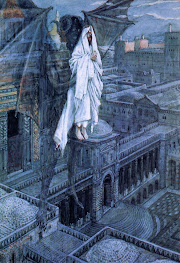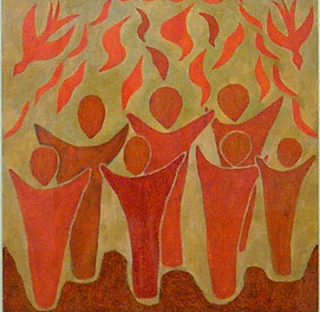Trinity I
6th Sunday before
Easter (Sunday after Ash Wednesday)
Matthew 4:1-11
Tissot
Then
Jesus was led by the Spirit into the loneliness of the desert to experience
the
tempting power of the adversary.
After fasting forty days and nights, He felt for the first time hunger for earthly nourishment. Then the tempter came to him and said, "If you are the Son of God, let these stones become bread through the power of your word."
Jesus answered, "It is written, 'The human being shall not live on bread alone; he lives by the creative power of every word that comes from the mouth of God."
Then the devil took him to
the holy city and had him stand Tissot
on the parapet of the temple. "If you are
the Son of God," he said, "throw yourself down. For it is written, 'He
will command his angels concerning you, and they will lift you up in their
hands so that you will not strike your foot against a stone.' "
Jesus answered him, "Do not put the Lord your God to the test."
Again a third time, the
devil took him to a very elevated place
and showed him all the kingdoms of the world and their splendor. "All this
I will give to you," he said, "if you will bow down and worship me
as your Lord." Tissot
Jesus said to him, "Away
from me, Satan! For it is written, 'You shall worship
[pray to] God your Lord
who guides you and serve him only.' "
Then the adversary left him, and he beheld the angels again as they came to bring him nourishment.
5th February Trinity
March 6, 2022
Matthew 4:1-11
To inhabit a human body is to be subject to very basic
needs: every infant first needs food, for to be in a body is to be hungry and
to depend on others to supply nourishment.
Another need is for safety—the body reflexively protects
itself against injury.
And a third need is for power, the ability to be effective.
To fail to respond to a child’s cries is to sow seeds despair in its soul.
At his Baptism Christ entered into a human body for the
first time. His spirit, like a child's, encounters the body’s basic needs,
which in the hands of the Adversary become demands.
But coming as He does from the heart of God, He counters the Adversary who
plagues humankind from within. And because He did, we can. For Christ has
become the medicine for the sickness of sin, our separation from God, that the
adversary engenders in us. He makes us whole. He re-establishes for us our
connection with God.
For it is God and his angels who satisfy our deepest
hungers. It is God who protects us both from harm and from an inflated sense of
self-importance. It is in aligning ourselves with God’s will, rather than merely
our own self-will, that we achieve true power; for the power that lies in
freedom from earthly compulsions
creates true effectiveness. Christ gives us that power.
 |
| Tissot |
…God is always there, if you feel
wounded. He kneels
over this earth like
a divine medic,
and His love thaws
the holy in us.*
*St. Teresa of
























